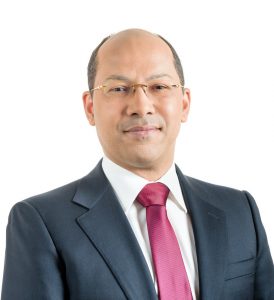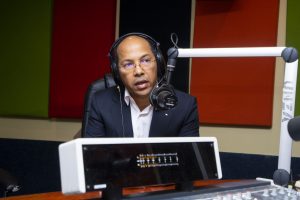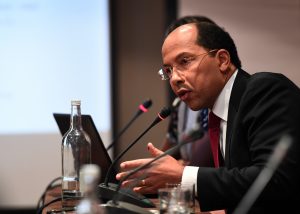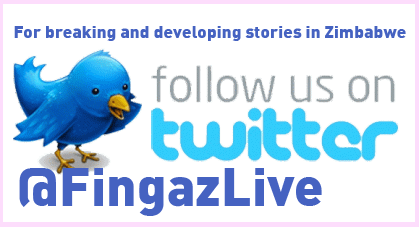


Nicolas Pompigne-Mognard, Founder and Chairman of APO Group.
NICOLAS Pompigne-Mognard, (NPM) Founder and Chairman of APO Group say the media should be used as an aid for development in Africa. He speak to The Financial Gazette’s Group Digital Editor, Paul Nyakazeya (PN) about, fake news, impact of social media to journalism and how the African story told by Africans can reach all corners of the continent.
PN: Twelve years on you founded APO Group, it has become a leading media consulting firm and press release distribution service in Africa and the Middle East. Looking back is there anything you would have done different?
NPM: A few things, yes. For starters, I wouldn’t have hired the same people at the beginning. I didn’t have a clear understanding of what my company needed, and I made some rooky mistakes. The first person I hired to drive the sales process had absolutely no experience in business development. Obviously, that had a huge impact on the growth of the business. But I accepted I made a mistake, and I made sure I learned from it. As founder and CEO – or as any entrepreneur – you have to make dozens of decisions on a daily basis, and, if you are not careful, some of them can be fatal for your company. Overall, when I look at APO Group now, I tell myself I must have made more good decisions than bad… We are growing strongly, and have doubled our turnover in the last two years.
PN: What lead you to form the APO Group?
NPM: I’d been thinking about press releases distribution in Africa for a long time. Quite simply, there was no formal channel for organisations to open dialogues and build relationships with African media. The big international press release distributors left Africa largely untouched. It was too complex a region, with more than 50 countries and (so they believed) little in the way of demand from their clients. But I was a European correspondent for Gabonews, and I had known for years how difficult it was to get hold of Africa-related press releases, press briefings and official statements issued by European-based institutions, NGOs, diplomacies and governments. As a journalist, I needed to receive all this information in order to stay on top of everything that was happening between Europe and Africa at a diplomatic, economic – even a cultural level. To access press releases, I had to subscribe to all the mailing lists and RSS feeds. Most organizations were only publishing their press releases on their websites, naively hoping that journalists would be constantly monitoring them all to see if anything new had been published. I was spending hours and days trying to reach the relevant people so they could send me their press releases. As I struggled, I realized that it was extremely problematic for any journalist to get all this Africa-related press release content – and that had some very bad consequences: First, the inability of African journalists to access this information was reinforcing their dependence on Western media and press agencies. Second, most of the press releases issued by African governments and African institutions never reached the international media community at all. Many even failed to reach the African media community. So, there was this huge gap in the market. The great thing for us at APO Group was that media relations in Africa was a blank canvas. We went in and started building up our media network and now we reach hundreds of thousands of journalists all over the continent. More than that: Because we were the first, we were able to build deep relationships and extensive knowledge on the media landscape. I’m proud to say we are now the market leader and going from strength to strength.
PN: Who are your blue-chip clients and which countries are you covering?
NPM: APO Group works with more than 300 prestigious clients, including 57 leading PR agencies and multinational companies across multiple industries. We are working with some huge organisations: Facebook, Canon, DHL, Hilton, Philips, Siemens, Ecobank, Dangote, Orange, General Electric, Nokia… And we are operating in all 54 markets of Africa, including countries like Somaliland and Eritrea – where we have organized the PR activities surrounding the inaugural flights of our client flydubai. Our geographical coverage is also one of the reasons so many public relations agencies are relying on APO Group’s media expertise to increase their clients’ exposure.
PN: You have worked in Europe and Africa as a journalist, what are the similarities and differences?
NPM: I was the correspondent in Europe for online media Gabonews and the Deputy-President of the Panafrican Presse Association in France (APPA), before I created APO Group. In January this year, I started a series of conferences in leading journalism schools and universities across Africa. I believe I can safely say that European journalists and African journalists don’t have the same life at all. At the most fundamental level, African journalists are frequently underpaid and under-equipped, but some also face the very real threat of being injured, killed, jailed or threatened in the line of duty. They actually have to fight on a daily basis: for more press freedom, more training, better access to public data, and so on. As I said, European journalists and African journalists simply do not live in the same world. And as the former Deputy-President of the Panafrican Presse Association in France, I could also tell you about the life of the correspondent of African media in France and in Belgium. I have witnessed outrageous things, believe me.

“The great thing for us at APO Group was that media relations in Africa was a blank canvas.”
PN: APO Group is currently one of the leading media relations consulting firm in Africa and the Middle East. What exactly are the services you are providing to your clients?
NPM: APO Group services include the organisation of press events, media coverage for clients (TV, print, online), press release, photo and video distribution, as well as advisory retainers. Our aim is to offer clients in-depth communications knowledge with versatile ways of increasing visibility on the African continent. Although a client can purchase one-off services, we also carry out complex projects using our media relations experts to optimize their communications goals. Clients benefit from our cross-sector expertise, extensive communications experience and a very strong innovation culture that enables us to design strategies unique to each campaign. We are the only company in Africa able to offer press release, photo and video distribution to all 54 African countries, and to 250+ African news websites. We’ve built a strong social media service and also provide monitoring reports for our clients’ press releases, giving them insights into how print journalists and online sources are covering their stories. We have managed to create a leading platform that helps our international clients share their messages across the continent with the right journalists, on the right media platforms, at the right time. With the expansion of our Advisory department, APO Group also has the capacity to consistently deliver high customer satisfaction in challenging environments by building and implementing communication strategies that help them to achieve their business objectives.
PN: How has the social media and spreading of fake news affected your operations?
NPM: Clearly it has become a huge talking point all over the world. For news distributors, it has never been more important to ensure audiences are receiving credible, factually accurate information. Africa, in particular, has been a breeding ground for misinformation – with campaigns on social media fuelling divisive political propaganda and corruption. But, actually, all of the noise around fake news at the moment serves to highlight how valuable an organization like APO Group is in identifying authentic stories and weeding out damaging and inaccurate ones. These days, anyone can become a “publisher”. Vast audiences are merely a click away. Not so long ago, this was seen as a positive thing. User-generated content allowed for wider debate and engagement. But it can also be dangerous. As a news distributor, we have a duty of care not only to our clients – but also to the media, who see us as a crucial, reliable Primary Information Provider. When we issue a story, it is not just going to one recipient – but to newsrooms all over Africa and the world. It’s why APO Group have always maintained a strong set of checks and balances to ensure the authenticity of the news releases we publish. Most important of all, we have made it a fundamental rule never to relinquish a human editorial presence. We will always check the validity of our news releases sources, and if we have any doubt whatsoever, we simply don’t distribute. I don’t think it is an overstatement to say that APO Group is a beacon for authentic content in a chaotic world of fake news and misinformation.
PN: You recently signed a strategic partnership with Getty Images, a world leader in visual communications. How is this partnership going to help convey a better image of Africa across the world?
NPM: It’s such an important and exciting partnership for APO Group. Right from the start, back in 2007, our vision was to change the narrative about Africa. To put Africa in the international spotlight. Getty Images are perfectly placed to help us do that. As the global leader in photographic and video content, Getty Images has the potential to influence the world’s perception of Africa through its imagery and help support an African narrative that attracts more investment to the continent by providing content to major international broadcasters. We are already the leading corporate news service dedicated to Africa, but when you combine that presence with Getty Images – what you have is a recipe to portray a more positive image of Africa all over the world. By working together in the region, I strongly believe Getty Images and APO Group will be a force in raising the profile of Africa on an international scale.

“Focus all your efforts on increasing the value of your company. That requires investment and time.”
FG: From your experience, what are the biggest problems that news agencies are facing today?
NM: Digitalization, monetization and talent management are the most obvious problems. But I actually believe the expansion of international media in Africa is an even bigger and much more pressing issue. With BBC, CNN, Washington Post, Huffington Post, Xinhua and many others expanding across the continent, I’m worried African media now face far more powerful competition than they can handle. The problem is, according to some research – in Nigeria for instance – the middle class is starting to spend more time watching international TV channels than local ones. This is causing advertisers to abandon the African media and spend their budget with the larger international players. I believe that is the biggest problem African media are facing today – by far.
PN: What would your advice be to a 20-year-old who is fresh out of school and wants to become a journalist and maybe build a media company in the future?
NPM: First, you need to understand that you too can create a business and that journalism is one of the most advantageous professions for someone with an entrepreneurial spirit. Because you can ask questions to everybody and they will usually fall over themselves to you! Whenever you get the opportunity to travel or meet new people, you need to take it. You might gain different perspectives, learn new skills or meet somebody that can help with your development. You need to work harder than the rest and be ready to sacrifice a few years of your life. That means working at least 12 hours a day, including weekends, having a healthy lifestyle and committing yourself to your goals. You need to go big or go home. Africa is 54 countries, but with just two languages (English and French) you can cover most of the markets. Do not hesitate to take on bigger, well-established companies. 1% of the African toilet paper market is good enough for you to make a lot of money. If you can do it alone, then do it alone. Avoid creating with co-founders, investors and so on. Why would you allow anybody to get involved who might slow you down, contest, or even block your decisions? Reinvest all the money you earn in the early years. Your objective is not to buy a Ferrari the moment you can afford it, and then see your company slowly disappear because of a lack of investment. You are building something for the long run. Focus all your efforts on increasing the value of your company. That requires investment and time. Never recruit friends or family. Hire talents. Surround yourself with people who are better than you are at what they do. Learn to pass on your knowledge and to delegate. A good entrepreneur is the one who can die today without jeopardizing the future of his company. You need to work very hard on making yourself obsolete. Understand that the true wealth of your company is your employees. Without them you are nothing. Always pay your employees on time, even if there is nothing left for you. Be flexible, do not hesitate to change the model of your company along the way. Do not disperse. Focus on what works – even if it’s not exactly what you planned at the beginning. Create an ecosystem of partners and suppliers around your company that will help to reinforce your culture and your message. Do not fall in love with your service or product. Even if it is not perfectly ready to go to market, launch it now, before a competitor does. You will have the time to refine later. Don’t forget you are here to sell, make money, and change the world.

PM: How is the media is contributing to Africa’s growth?
NPM: It might sound obvious coming from someone with a press release background, but I strongly believe that creating a mutually beneficial and lasting relationship between business and the media is vital for Africa to grow and increase its exposure on the global stage. Back in 2007, I had a series of discussions with the President of the African Development Bank at the time, Donald Kaberuka, who explained to me how crucial the dissemination of news about Africa’s economy was to the development of the continent. We needed to reverse the tide and make sure the international media community and all African media had access to news releases announcing new investments in Africa, new CEO appointments, new startups, new international events, new awards and so on. Of course, all this positive news is typically spread via press releases. A few months later, APO Group started signing strategic agreements with Bloomberg, Reuters, LexisNexis, Dow Jones Factiva and other major international players to guarantee the worldwide distribution of thousands of Africa-related press releases in a standardised, internationally-recognized NewsML format for the first time.